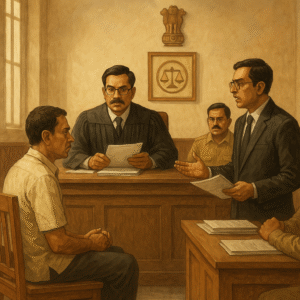Simplified Explanation of the Judgment
This judgment from the Patna High Court deals with a set of writ petitions filed by a works contractor against various departments of the Government of Bihar and tax authorities. The dispute arose because the contractor had quoted rates for government road works believing a lower tax would apply (as under the earlier VAT regime), but the authorities demanded tax at a higher rate under the Bihar Goods and Services Tax Act, 2017 (BGST). The contractor argued that any extra tax should be borne by the government department that awarded the work, not by the contractor. The Court rejected this argument and dismissed all the writ petitions.
Here is the context. The works contracts in question were awarded after the GST regime came into force on 01 July 2017. The agreements were executed in 2018, and the assessments under challenge covered several months in Financial Year 2018–19 (November 2018, January 2019, February 2019, March 2019) and June 2019 in Financial Year 2019–20. The core grievance was that the contractor had initially priced the bid assuming VAT-era tax at 4%, while the authorities applied GST at 12%. The contractor contended that (a) it had quoted under the Bihar VAT Act, 2005; (b) the Rural Works Department (as the “awarder”) was the real entity liable for tax; and (c) the difference should not be recovered from the contractor.
The Division Bench (Hon’ble the Chief Justice and Hon’ble Mr. Justice Partha Sarthy) noted that the tenders and the agreements were undeniably post-GST. A crucial clause of the Standard Bidding Document (often appearing as Clause 35) made it clear that the rates quoted by a bidder were “inclusive of all taxes and levies payable under the respective statutes.” In plain terms, when a contractor quotes a figure in such a tender, that figure must already account for GST and other statutory taxes. The Court said the contractor had “bid with open eyes,” fully aware of GST being the operative regime. Therefore, the contractor could not later claim that the government department should absorb the higher GST rate or that the contractor had no liability to pay tax on the works contract.
The contractor tried to rely on an earlier Patna High Court decision (Jai Bhawani Construction, CWJC 1452/2019 and analogous cases), where bids were submitted before GST began but tax liability was imposed under GST for work done after GST’s start date. In those pre-GST bids, the State had provided a mechanism to take care of tax rate escalation—effectively shifting the burden to the awarder. However, the Court said that principle did not apply here because the present tenders were floated and agreements executed after GST had already started. When bids and contracts are post-GST, the presumption of inclusive rates and the contractor’s responsibility for GST is much stronger.
The contractor also invoked Section 76 of the BGST Act (a provision that requires amounts collected as “tax” to be paid to the government even if not legally due). The Bench clarified that Section 76 is not a route for a contractor to avoid liability where tax is otherwise payable under law. If a person liable to pay GST fails to collect it from the recipient, that failure does not erase the liability to the government. In works contracts for government departments, the contractor is the registered person liable to pay GST on the taxable supply of works contract services; the contractor may recover the tax component from the awarder in accordance with the contract, but the statutory liability to the exchequer remains with the contractor. In these particular tenders, the SBD put bidders on notice that their quoted rates were inclusive of all taxes—so any shortfall or miscalculation in the bid price was a bidder’s commercial risk, not the government’s.
Importantly, the Division Bench followed its own earlier ruling in JMC Construction Private Ltd. v. Union of India (CWJC 10122/2023). In JMC, the Court had already held that where bids and agreements were post-GST, contractors could not seek reimbursement of the “differential” between VAT-era rates and GST rates, because at the time of bidding they were supposed to account for GST. The Bench reiterated that if any clause in the agreement refers to “service tax” or earlier enactments, such reference is a drafting vestige; the operative reality is GST from 01 July 2017. Moreover, where an agreement clause deems quoted rates “inclusive of all taxes,” only specifically exempted levies (like certain service tax exemptions for government works in the pre-GST era) could be treated differently; otherwise, taxes on goods and services used in the works contract are embedded in the quoted rate. The contractor is paid the contract value net of TDS and other statutory deductions.
On these findings, the Patna High Court dismissed all the writ petitions. The takeaway is simple but significant for contractors doing government works in Bihar: when bidding post-GST under an “inclusive of all taxes” tender, contractors must build the GST component into their rate. They cannot later pass the burden to the department or claim a refund/reimbursement for the higher GST rate.
Significance or Implication of the Judgment (For general public or government)
For contractors and vendors: This decision underscores that in “inclusive of taxes” tenders floated after 01 July 2017, the bidder bears the GST risk and must price bids accordingly. Contractors who misestimate tax cannot retroactively shift the burden to the government department or seek judicial relief to rewrite the commercial bargain. This enforces bid discipline and reduces post-award disputes.
For government departments: The judgment protects public finances from after-the-fact claims of “differential tax.” Departments can rely on SBD clauses to ensure that quoted rates are tax-inclusive, while continuing to make statutory deductions (like TDS under GST) at source. Clear tender wording and consistent post-GST contracting practice will minimize ambiguity and litigation.
For taxpayers and the general public: Fewer disputes over tax components in public works should translate into better predictability in project costs and timelines. By affirming that post-GST bids are presumed to include GST, the Court promotes transparency and fiscal certainty in public procurement.
Legal Issue(s) Decided and the Court’s Decision with reasoning
- Whether a works contractor, whose bids and agreements were post-GST, can avoid GST liability or shift it to the government department on the ground that earlier VAT rates were lower.
— Decision: No. The contractor bid post-GST under a clause deeming rates “inclusive of all taxes.” The contractor is liable to pay GST and cannot demand reimbursement from the department. - Applicability of pre-GST tender jurisprudence (e.g., reimbursement mechanisms) to post-GST bids.
— Decision: Not applicable. Earlier cases like the pre-GST Jai Bhawani batch concerned bids submitted before GST commenced; those facts are distinguishable. - Relevance of Section 76 BGST (amounts collected as tax to be deposited) to a contractor’s GST liability where the contractor did not collect tax.
— Decision: Section 76 does not erase a statutory tax liability. Failure to collect from the recipient does not absolve the contractor’s liability to the government.
Judgments Referred by Parties
- Jai Bhawani Construction v. Union of India & Ors., CWJC No. 1452 of 2019 (and analogous cases) — relied upon by the petitioner to argue reimbursement / shifting of liability based on pre-GST bids.
Judgments Relied Upon or Cited by Court
- JMC Construction Private Ltd. v. Union of India & Ors., CWJC No. 10122 of 2023 (Patna High Court, Division Bench) — followed to hold that post-GST bids are presumed tax-inclusive and reimbursement of “differential tax” is impermissible.
Case Title
M/s. Satyendra Prasad Vs. The State of Bihar
Case Number
CWJC No. 5549 of 2024; with CWJC Nos. 5550 of 2024, 5552 of 2024, 6605 of 2024, and 6791 of 2024.
Coram and Names of Judges
Hon’ble the Chief Justice (K. Vinod Chandran, CJ) and Hon’ble Mr. Justice Partha Sarthy. Judgment dated 12-09-2024.
Names of Advocates and who they appeared for
- For the petitioner(s): Mr. Akash Chaturvedi, Advocate; Mr. Sriram Krishna, Advocate.
- For the respondent(s): Mr. Vikas Kumar, SC-11.
Link to Judgment
MTUjNTU0OSMyMDI0IzEjTg==-vwW–am1–Nki41C0=
If you found this explanation helpful and wish to stay informed about how legal developments may affect your rights in Bihar, you may consider following Samvida Law Associates for more updates.








